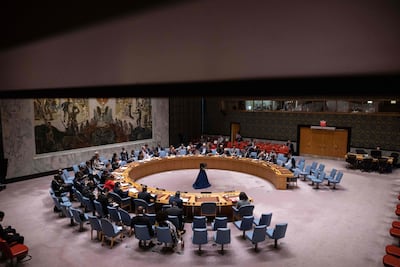The UN Security Council on Tuesday failed to approve two rival resolutions that would have kept a key border crossing from Turkey to north-west Syria open for life-saving aid to more than four million people.
Russia vetoed Switzerland and Brazil's proposal to keep the Bab Al Hawa crossing open for nine months. The resolution was supported by 13 of the Security Council's members, with China abstaining.
A rival Russian resolution that would have extended the aid deliveries for six months but added new requirements failed to get the minimum nine “yes” votes for approval.
A statement from UN Secretary General Antonio Guterres said he was “disappointed” that the Security Council had failed to keep open “a veritable lifeline for millions”.
Mr Guterres called “on all council members to redouble their efforts to support the continued delivery of cross-border assistance to millions of people in dire need in north-west Syria for the longest possible period”.
The mandate for the operation, which has been delivering aid including food, medicine and shelter since 2014, expired on Monday.
Authorisation is needed because Syrian authorities did not agree to the operation. In 2022 and 2020, the mandate for the operation ran out, but was renewed a day later.
Russia's envoy to the UN, Vasily Nebenzya, accused western countries of a “complete disregard for the interests of the Syrian people and the intent to artificially provoke Russia into using the veto”.
Before the council vote on Russia's proposal, Mr Nebenzya said: “If our draft is not supported, then we can just go ahead and close down the cross-border mechanism … The technical rollover for any period of time we're not going to accept.”

David Miliband, the president and chief executive of the International Rescue Committee, condemned Russia's veto of the nine-month extension.
“This resolution is a critical lifeline for millions of Syrians, with no viable alternative to meet the growing humanitarian needs in north-west Syria,” he said in a statement.
“It defies reason and principle, that Security Council members would vote to not maintain all avenues of aid access for vulnerable Syrians at this time.”
US ambassador to the UN Linda Thomas-Greenfield, meanwhile, called the veto “an act of utter cruelty”.
She said Russia refused to “meaningfully” participate in negotiations and instead demanded everyone accepts its ultimatum “like a bully in the playground”.
The Security Council initially authorised aid deliveries in 2014 from Turkey, Iraq and Jordan through four crossing points into opposition-held areas in Syria. But over the years, Syria’s close ally Russia reduced the authorised crossings to Bab Al Hawa from Turkey and cut down the mandate from a year to six months.
Russia was pushing for more aid to be delivered across front lines within Syria, which would give Damascus control over the shipments. They have always maintained that any cross-border assistance is a breach of Syria’s territorial sovereignty.
Syria's ambassador to the UN Bassem Sabbagh urged the council “to activate cross-line deliveries, especially in light of the abject failure to run any aid convoy in the past six months”.
UN spokesman Stephane Dujarric said cross-border aid lines are "complicated" due to the need to ensure that "everyone is on the same page and everyone lets the humanitarian aid through".
"We have very productive discussions with the Syrian government on this issue. It obviously also involves other actors, which makes it very challenging," he said.
Speaking to reporters, Switzerland's UN ambassador Pascale Baeriswyl said she would “spare no effort to find a solution”.
“We will continue to engage with all council members in an inclusive and transparent process to find consensus on outstanding issues and to bridge divergent positions. There is no time to waste. We owe it to the people of Syria,” she said.
Ms Thomas-Greenfield told journalists that Russia must explain the veto to the UN General Assembly.
“They said to us in the council today that they were forced to veto. They chose to veto. They were given practically everything that they wanted,” she said.
In April 2022, the UN General Assembly adopted a resolution which calls for the body to meet whenever a veto is cast in the Security Council. The head of the General Assembly will convene a formal meeting to hold a debate on the vetoed subject within 10 working days.
US State Department spokesman Matthew Miller called Russia's veto "inhumane".
"The United States will continue to support the Syrian people and we remain committed to reauthorising the cross-border mechanism," Mr Miller said.
"It's a moral and humanitarian imperative, and the Syrian people are counting on us to get this done."
Floriane Borel, UN advocacy officer at Human Rights Watch, condemned Russia's “cynical” veto as “a painful reminder that the Security Council should not be entrusted with decisions about humanitarian assistance”.
“Aid delivery should be based on needs, not politics,” she said.


